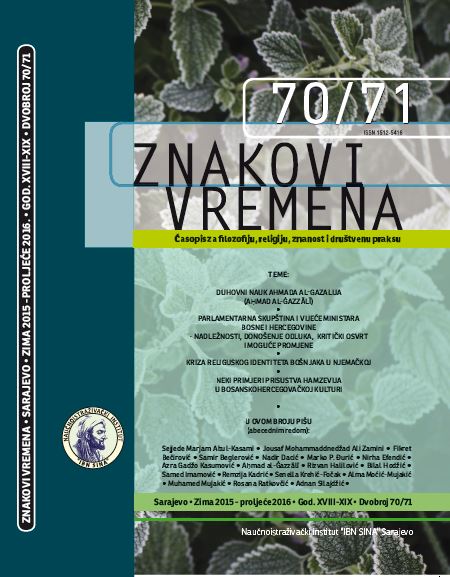Vijeće ministara Bosne i Hercegovine - nadležnosti, donošenje odluka, kritički osvrt i moguće promjene
COUNCIL OF MINISTERS OF BOSNIA AND HERZEGOVINA - COMPETENCE, DECISION-MAKING, CRITICAL REVIEW AND POSSIBLE CHANGES
Author(s): Muhamed MujakićSubject(s): Constitutional Law, Governance, Government/Political systems
Published by: Naučnoistraživački institut »Ibn Sina«
Keywords: Council of Ministers; Constitution of Bosnia and Herzegovina; ministries; competences; decision-making procedure;
Summary/Abstract: In this article, the Council of Ministers of Bosnia and Herzegovina has been presented as one of the holders of executive power, which, at the state level of Bosnia and Herzegovina, is dualistic. In addition to the Council of Ministers, the Presidency of Bosnia and Herzegovina is the first executive body. In this paper, it has been presented the institution of the Council of Ministers, its composition, election methods and procedures, its role, functioning of the Council of Ministers through ministries and other institutions of executive authority of Bosnia and Herzegovina, as well as the decision-making procedures at the Council of Ministers of Bosnia and Herzegovina. The Council of Ministers is a collegial body composed of a chairman and ministers. In forming the composition of the Council of Ministers, in accordance to the Constitution, there must be given the appropriate entity representation in a way that not more than two-thirds of all Ministers are appointed from the territory of the Federation of Bosnia and Herzegovina. The article discusses how the competence of the Council of Ministers is very sparingly prescribed by the Constitution. The main competence of the Council of Ministers is the implementation of policies and the execution of decisions of all institutions of Bosnia and Herzegovina, which includes acts and other decisions made by the Parliamentary assembly. The competence also includes the achievement of coordination between the entities performed by the Presidency and additional responsibilities that, according to the Constitution, are undertaken by the institutions of Bosnia and Herzegovina, as well as those resulting from the coordination of entities and additional responsibilities (competences). The authors give their review of possible changes that would imply additional capacities of this important organ of executive power and its transformation into a classic government.
Journal: Znakovi vremena - Časopis za filozofiju, religiju, znanost i društvenu praksu
- Issue Year: XVIII/2016
- Issue No: 70/71
- Page Range: 142-158
- Page Count: 17
- Language: Bosnian

